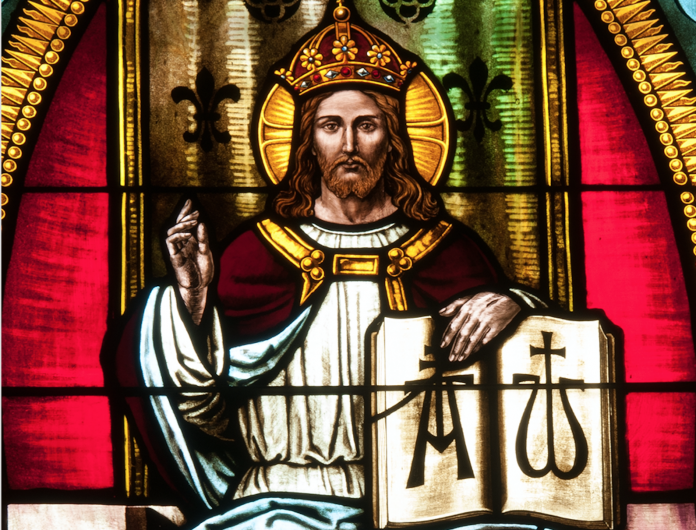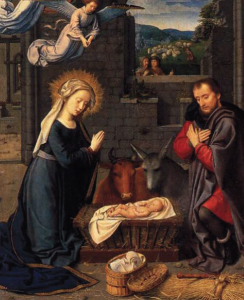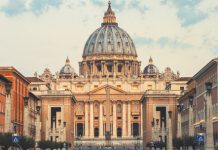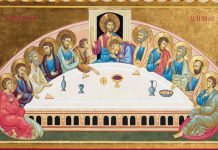
Editors Note: This article offers commentary and reflection questions for each Sunday Gospel for November (the final weeks of Ordinary Time) and December (the beginning of Advent) 2017.
Use the links below to find for downloadable PDFs of The Sunday Gospel from the print edition Catechist magazine, Nov/Dec 2017. The full article follows the links.
For the November Sundays, click here: CAT.Nov_Dec2017_SundayGospel
For the December Sundays, click here: CAT._Dec2017_SundayGospel_web
Lessons in Eschatology
The final weeks of Ordinary Time
By Amy Ekeh
NOVEMBER 5
31st Sunday in Ordinary Time
Matthew 23:1-12
Reflect: In October’s readings from the Gospel of Matthew, we read about increasing tension between Jesus and the religious leaders. With parables and strong words, Jesus told the religious leaders that they had failed to recognize God’s kingdom breaking into the world.
In today’s Gospel Jesus continues his criticism of the religious leaders, this time speaking to the crowds and focusing on one fatal flaw of the scribes and Pharisees: hypocrisy. This common flaw is part of being human, but among the leaders of the people, Jesus finds it especially pervasive and detestable.
Jesus remarks that these leaders claim teaching authority but do not even practice what they themselves teach. They burden the people but do not share the burden. On top of this they crave adulation, honor, deference, and greatness. They exalt themselves.
Although there were certainly good, humble, and honest men among the Jewish religious leadership in the time of Jesus, it is clear that Jesus was disappointed in Israel’s leaders as a whole. Jesus’ own life of humility, compassion, and self-giving stood in direct opposition to the shallow values he saw among the men that became first his critics and then his enemies.
We can imagine Jesus looking at the people of God — the Israelites — with love and empathy. Their leaders had failed to guide them in the ways of gentleness, humility, and love. Their leaders had failed to guide them in the ways of God. This is why Jesus told the people that they should no longer call anyone teacher, father, or master. Instead he boldly declared: “You have but one master, the Christ.”
It is not that Jesus wanted the religious leaders to be condemned or demoralized. But he wanted them to wake up to the ways of God, the ways of the kingdom. Jesus himself, by word and deed, showed the way to do this. Jesus was humble: “Learn from me, for I am meek and humble of heart” (Matthew 11:29). He shared the burdens of his people: “Come to me, all you who labor and are burdened, and I will give you rest” (Matthew 11:28). And even when it cost him his life, he practiced what he preached: “The greatest among you must be your servant” (Matthew 23:11).
Ask yourself: In what way am I a “religious leader” in my community? Have I considered the responsibility that I have in catechetical ministry to practice what I preach? Am I sharing the burdens of those I serve?
Ask your students: Jesus was very critical of the religious leaders of his time. Do you think he loved them? Why do you think his words were especially harsh toward this group of people? What responsibility did they have that they failed to carry out?
Pray: Jesus, you hated hypocrisy. Help me to clearly see and root out the hypocrisy in my own life. May I always follow your example of humility and service.
Live the Gospel: This week find a few small ways to exercise humility and quietly share the burdens of others. Perform a task you normally would not do, or do something for someone but remain anonymous. Reflect on these small acts and consider how intentional humility can be a part of your every day life.
NOVEMBER 12
32nd Sunday in Ordinary Time

Matthew 25:1-13
Reflect: In this Sunday’s Gospel reading, we skip forward a few chapters in Matthew’s Gospel into the middle of what scholars call Jesus’ eschatological discourse. You may recall that there are five major discourses (or thematic collections of Jesus’ sayings) in the Gospel of Matthew. These are the Sermon on the Mount (5–7), the Missionary Discourse (10), the Parables of the Kingdom of God (13), the Discourse on the Church (18), and the Eschatological Discourse (24–25).
Matthew 25 is a collection of three major parables with eschatological themes. The word eschatology derives from the Greek word eskhatos meaning “last.” Eschatology is the study of the “last things,” traditionally categorized as death, judgment, heaven, and hell. Eschatology explores Christianity’s unique understanding of the end of the present age, or the end of the world as we know it, and the coming of God’s kingdom in its fullness. This eschatological perspective is grounded in a variety of influences, especially in Christianity’s Jewish roots and in the words of Jesus himself. These three parables (which we will read for the three remaining Sundays in November) will explore some themes and ideas pertaining to the end of the age.
Today’s parable of the 10 virgins, or 10 maidens, is a parable about watchfulness and readiness for the end of the age. The key event of this end time is the return of the Son of Man, clearly identified with Jesus. When Jesus — the bridegroom — returns, some will be ready for him, and some will not. Those who are prepared will enter into his kingdom with him. Those who are not prepared will find the door closed. In fact, the bridegroom will say to them, “I do not know you” (Matthew 25:12).
Jesus does not always explain his parables, but in this case he does. He ends with a clear “moral” or message: “Therefore, stay awake, for you know neither the day nor the hour” (Matthew 25:13). The end times may seem far away, but we are to live in watchful readiness for the return of the bridegroom and the fullness of God’s kingdom.
Ask yourself: Am I ready for the return of Jesus? How would I change my life, my actions, if I knew he was coming very soon?
Ask your students: What do you think it means to “watch” for the return of Jesus? What does it mean to be prepared, like the five wise maidens who had enough oil for their lamps?
Pray: Jesus our bridegroom, wake us when we grow drowsy and fall asleep so we may rise up, trim our lamps, and come out to meet you.
Live the Gospel: What kinds of things would Jesus expect you to be doing upon his return? What is the oil you might need for your lamp — prayer, service, repentance? Identify the thing that has prevented you from filling your lamp to the brim, and make some positive movement toward being ready for Jesus by doing that thing this week.
NOVEMBER 19
33rd Sunday in Ordinary Time
Matthew 25:14-30
Reflect: The second parable in Matthew 25 is known as the parable of the talents. This is certainly one of those parables that should send a chill down the spine of every single one of us! We might imagine Jesus the preacher constructing this detailed story in his mind as he prepared to teach the people. As we know, Jesus did not flinch from telling the truth or prodding his listeners forward in their understanding of God’s love and expectations.
This familiar story tells of a master and three of his servants. Going away on a journey, the master entrusts his money to his servants before leaving. He divides the money unevenly, giving five talents (a very large sum of money) to the first servant, two talents to the second, and only one talent to the last. As the parable continues, we come to understand that the master intended the servants not only to keep the money safe, but to invest it. The money was meant to increase while the master was away.
The first two servants succeed in this endeavor. Both of them make profitable trades, thus doubling their funds. But the last servant does not do so well. Afraid of the master and his expectations, this servant “dug a hole in the ground and buried his master’s money” (Matthew 25:18).
The first two servants are commended by the returning master, who pledges his trust in them by promising them further responsibility and inviting them to “share [their] master’s joy” (verse 21). But the master is surprisingly harsh with the last servant, the one who hid his single talent. As he hands the talent back to his master, he admits that he hid the talent out of fear. The master does not mince words or hide his displeasure. He calls this servant “wicked and lazy” (verse 26). He asks why he did not even make a minimal effort to grow the money. He orders the money taken from him and given to the first servant. He then orders the last servant to be thrown “into the darkness outside, where there will be wailing and grinding of teeth” (Matthew 25:30).
The reaction of the master to this fearful servant, as told by Jesus, may seem excessively severe. But that is exactly the point. An effective preacher, Jesus hammers home his message with the deft use of hyperbole (exaggeration). There is no room for fear in the kingdom of God. There is no place for excuses or inaction. There are expectations for growth, change, and bearing fruit. There are expectations for putting everything we have to work for the master and his purposes.
Those who succeed, who bear fruit with what they have been given, will be given even more. The greatest gift of all is the promise of the master: “Come, share my joy” (Matthew 25:23).
Note: Although this parable is not about “talent” in the sense of personal abilities, you may be interested to know that the modern use of the word talent as an ability does derive from this well-known parable. The fact that some servants performed better than others ultimately became associated with the word for the money they managed (the “talent”).
Ask yourself: What is Jesus expecting of me while he is “away”? What has he given me — time, talent, treasure — that is meant to bear fruit in this world? Am I willing to take risks to do this?
Ask your students: Why do you think the master is so harsh with the final servant? What did he want the servant to do? Do you think God wants us to take risks? What kind of risks?
Pray: Jesus, your stories help me examine my life, just as they did for those who heard you 2,000 years ago. May your words penetrate my heart and change me.
Live the Gospel: Identify something you feel Jesus is calling you to do but you have hesitated to do. What is holding you back? Are you afraid you will fail? According to this parable, doing nothing is unacceptable in God’s kingdom. Ask God for strength to do what he asks of you, and then take a step forward.
NOVEMBER 26
Our Lord Jesus Christ, King of the Universe
Matthew 25:31-46
Reflect: This Sunday we celebrate the feast of Christ the King, which is the last Sunday in the liturgical year (Year A). Next Sunday is the First Sunday in Advent, and a new liturgical year will begin. In Year B, we will be reading mostly from the Gospel of Mark, so this Sunday concludes our time spent with Matthew’s Gospel.
Our Gospel reading from Matthew takes up where last week’s reading left off. Here we have the third in a series of eschatological (focusing on the end times) parables. The previous two parables were about watching and being ready for the return of Jesus. In this week’s parable, we see a dramatic scene — a king is judging the nations, separating “sheep” from “goats.”
First, it should be mentioned that some commentators do not consider this Gospel passage to be a parable in the classic sense. While it is a narrative that contains a message (the word parable essentially means “allegory”), it is perhaps more accurately described as an eschatological judgment scene. It is an envisioning of the judgment of the nations by Christ himself.
Of course the most striking and ingenious thing about this judgment scene is the criteria by which the king is judging the people. What are the king’s expectations? How are we supposed to act as we wait for his return, watchful and ready? Recalling the images from the previous two parables, what oil must we put in our lamps? What must we do with the gifts and responsibilities the master has given us?
The answer is simple. There is only one way to ensure that there will always be oil in our lamps and that we will continuously bear fruit as we wait for the return of the master: In his absence, we must love one another. And, as the king explains, it is in loving one another — especially those among us who are most in need — that we make him present (“you did it for me”). If, by loving another, we are also showing love to him, then even as we wait and watch for his return, the king already reigns among us.
Ask yourself: How do I feed the hungry in my life? How do I help to satisfy the thirst of those who are looking for something more? Do I welcome strangers? Do I help to clothe those who have lost their dignity or who feel embarrassed? Do I visit strangers — those in prison, or those who feel imprisoned by loneliness or pain?
Ask your students: Jesus said that whenever we do something to help someone, we are doing it for him: “I was hungry and you gave me food, I was thirsty and you gave me drink” (Matthew 25:35). Can you explain what Jesus meant in your own words? Who can you help?
Pray: Christ my King, may I serve you in every person who comes into my life.
Live the Gospel: This passage from Matthew 25 lists what we now call the “corporal works of mercy” (along with burying the dead). This week, choose one of these works of mercy to live out in some concrete way: Feed the hungry, give drink to the thirsty, welcome the stranger, clothe the naked, visit the sick, or visit the imprisoned. Keep in mind that you may not even need to go beyond the walls of your own home to do these things. And there, in the one you serve and love, you will find Christ the King.
The Four Weeks of Advent
Watching and waiting for our Savior
DECEMBER 3
1st Sunday of Advent
Mark 13:33-37
Reflect: The first Sunday of Advent begins a new liturgical year. Year B will run from this Sunday through the Sunday of Christ the King in 2018. In Year B our Gospel readings primarily draw from the Gospel of Mark. Because Mark’s Gospel is the shortest of all the Gospels, it will be supplemented by the Gospel of John at some points during the year. As always, during special seasons like Advent, Christmas, Lent, and Easter, the Gospel reading will at times be taken from other Gospels.
During Advent the liturgy urges us to watch and wait for the coming of our Savior. Of course, this waiting has a twofold purpose. On one hand, we anticipate the Incarnation of Christ, the coming of God into the world as a human being (advent means “to come” or “to arrive”). At Christmas we will celebrate this Incarnation as we recall and make present the birth of Jesus. But during Advent we are also waiting and hoping for the return of Christ at the end of the age. As our readings these last several weeks have already proclaimed, our faith in the Incarnate Christ has an eschatological dimension: We wait and hope for his final coming, a time when Christ will come to be with his people, a time when he will not depart again.
Today’s Gospel reading takes up this idea of waiting and watching. Jesus tells his disciples to “Be watchful!” and “Be alert!” He tells the story of a man who leaves his servants in charge of his home and a gatekeeper on watch while he travels. Jesus says that these servants must be ready at any time for the master of the house to return.
What will these servants be doing while the master is away? They will be doing their work. They will be taking care of the house. What is our work while Christ is away? The answer is simple: to love the Lord our God with all our heart, soul, and mind, and to love our neighbor as ourselves. This is the work Christ has given us to do; this is how we care for his house, his people, his Church. This is how we watch and wait for his return.
Ask yourself: Am I watchful and alert? Do I believe Jesus will return? What should I be doing differently if I truly believe this?
Ask your students: Jesus offered many warnings to his disciples to be ready for him to return. But Jesus has not returned yet, and it has been 2,000 years! What do you think about the advent (or coming) of Jesus?
Pray: Lord Jesus, may I live in a state of watchfulness and readiness as I await your advent, your coming, into the world and into my life.
Live the Gospel: We know that we should live in such a way that we are doing Christ’s work, so that he will find us ready when he returns. How can you do Christ’s work this week? How can you live in such a way that if Jesus returned, you would not be startled by his coming?
DECEMBER 10
2nd Sunday of Advent
Mark 1:1-8
Reflect: John the Baptist is a “major player” during the Advent season. He always makes an appearance in the Gospel reading for the second Sunday of Advent, proclaiming the imminent arrival of Christ and telling the people how to prepare. His message offers a most appropriate hinge connecting our twofold dynamic of Advent anticipation: awaiting the coming of Jesus as the Messiah who walked the dusty roads of Israel two thousand years ago, and awaiting his triumphant return as Lord of all at the end of time. John the Baptist tells us how to prepare for both arrivals!
We are told that John the Baptist proclaimed “a baptism of repentance for the forgiveness of sins” (Mark 1:4). This baptism of John was not the same type of baptism that we participate in as Christians. (For Christians, baptism is also a participation in the death and resurrection of Jesus). But it was deeply meaningful and appropriate preparation for the coming of a Savior. To repent was not just to feel bad about oneself or one’s sins. To repent was to have a change of heart, to change one’s ways. Certainly repentance includes sorrow for sin, and the Gospels tell us that John’s baptism forgave the sins of the people, who came out in droves to acknowledge their sins and be baptized by John.
Why was this baptism of repentance a fitting preparation for the coming of a Savior? Because when we repent, we declare our need for a Savior. We acknowledge a need within ourselves. We open a door for him. We make straight his path — straight to our hearts.
“One mightier than I is coming,” declares the great John the Baptist. “He will baptize you with the Holy Spirit” (Mark 1:7, 8). Let us also repent, so Jesus’ path may be straight. Let us make room for the Savior, who will be born in Bethlehem, and who will be born in our hearts, and who will return for us at the end of the age.
Ask yourself: What does repentance mean to me? What does it mean to have a change of heart? How can I nurture a spirit of repentance in my life and ready my heart for the coming of Christ?
Ask your students: Why do you think so many people went out into the desert to hear John the Baptist and to acknowledge their sins to him and be baptized by him? What do you think they liked about his message?
Pray: John the Baptist, pray for me, that I may prepare the way of the Lord in my life, my relationships, my work, and my world.
Live the Gospel: This week, every morning, repeat the words of the prophet Isaiah, describing the ministry of John the Baptist: “Prepare the way of the Lord, make straight his paths.” How can you prepare the way for the coming of Jesus into our world? Can your love for others make his path straighter?
DECEMBER 17
3rd Sunday of Advent
John 1:6-8, 19-28
Reflect: The third Sunday in Advent is traditionally known as Gaudete Sunday (or “Rejoice Sunday”). As we light the rose-colored candle on our Advent wreaths, we notice how close we are to Christmas, how close we are to celebrating the birth of Jesus. This observation brings us joy and renews our desire to be prepared for his coming.
Turning to John’s Gospel this Sunday, we once again visit the person and ministry of John the Baptist. At the heart of his identity are these words written by John the evangelist: “He [John] was not the light, but came to testify to the light.” Of course, Jesus is the light that is coming into the world (see John 1:9).
Last week’s Gospel and this week’s Gospel both emphasize the role of John the Baptist as the forerunner of Jesus — the one who prepared the way for his coming and testified to his true identity. This emphasis on “preparing the way” and properly identifying Jesus are at the heart of our Advent experience, and indeed, at the heart of our Christian experience. As we prepare for his coming — at his Incarnation that we celebrate at Christmas, but also at the end of the age when he returns — we join John the Baptist in his work. We, too, cry out into the desert, bearing witness to the coming of the light. We, too, must do our part to prepare the way for his coming.
John the Baptist recognized something fundamental to faith. He was always oriented toward another. John did not look to himself for the answers. He did not look to himself to secure his own future. He did not look to himself for salvation. John was a great prophet — in fact Jesus called him the greatest human being who had ever lived (in Matthew 11:11)! And yet even a great prophet like John found his identity in his relationship with Jesus, the Christ.
As we journey into our final weeks of Advent preparation, may we also orient ourselves entirely toward Jesus Christ.
Ask yourself: How do I testify to the presence and identity of Jesus? How do I do this in my catechetical ministry?
Ask your students: John’s Gospel describes Jesus as light: “The true light, which enlightens everyone, was coming into the world” (John 1:9). Why do you think Jesus is called light? What does light look like? How do we experience it? What does light do for us?
Pray: Jesus, you are the light that has come into the world. Help me to testify to your presence.
Live the Gospel: There are many ways to testify or witness to the presence and true identity of Jesus. John the Baptist had his own unique way. How you can you testify to the light this week: at home, in your classroom, in a relationship, in the world?
DECEMBER 24
4th Sunday of Advent
Luke 1:26-38
Reflect: On the final Sunday of Advent, we turn our full attention to the birth of Jesus. This year, we have the latest possible date for the Fourth Sunday of Advent — December 24!
In this Sunday’s Gospel, we hear the familiar story of the Annunciation, or “the announcement,” of the angel Gabriel to Mary. Gabriel tells Mary that she will bear a Son who will be great. He will sit on the throne of David. He will be called the Son of God, and he will be named Jesus, which means “he saves.”
Since we have focused so much on John the Baptist on previous Sundays, it may be worthwhile to note the clear contrast drawn here between Jesus and John the Baptist. We know that John the Baptist is the forerunner of Jesus, the one who announced his coming. But Luke makes this clear in brilliant fashion.
The passage we read today, announcing the birth of Christ, immediately follows another annunciation. It follows the annunciation of the angel Gabriel to Zechariah, who will be the father of John the Baptist (see Luke 1:5-25). In this annunciation, we have a similar pattern including an angelic visitor, a miraculous pregnancy (Elizabeth is elderly and barren; Mary is young and a virgin), a response of surprise and confusion, and predictions about the child to be born.
Biblical scholar Luke Timothy Johnson helps us understand the contrasts Luke then draws between John the Baptist and Jesus, contrasts that help us understand the role and identity of both men:
John will be great before the Lord (1:15), but Jesus will be great and Son of the Most High (1:32). John will prepare a people (1:17), but Jesus will rule the people (1:33). John’s role is temporary (1:17), Jesus’ kingdom will never end (1:33). John is to be a prophet (1:15), but Jesus is more than another prophet: he is Son of God (1:35). John will be “filled with the Holy Spirit” as a prophet (1:15), but the overshadowing of the Spirit and Power will make Jesus “the Holy One” (1:35). (Luke Timothy Johnson, Sacra Pagina: The Gospel of Luke, Liturgical Press, 1991, p. 38)
This contrast helps us understand even more clearly why Jesus needed a predecessor, and why John the Baptist took his role so seriously. He was preparing the people for an eternal kingdom, and he was preparing their hearts to encounter the one who would reign over it forever.
Ask yourself: The angel Gabriel describes Jesus in many ways in this passage. Which phrase means the most to me? Why?
Ask your students: Mary was surprised by the angel’s announcement to her, but she agreed to be part of God’s plan and to do his will. Do you think this was easy or hard? Why?
Pray: St. Gabriel, when you encountered Mary, you encountered the fertile ground of her heart. Pray for me, that I may also be ready to say yes no matter what God asks of me.
Live the Gospel: Is it possible that God has tried to speak “annunciations” or “announcements” in our lives, but we were not listening? What is God asking us to do, but we have not given ourselves the time and space to say yes? This week make time to listen. Ask God to speak in the quiet of your heart.
 DECEMBER 31
DECEMBER 31
The Holy Family of Jesus, Mary, and Joseph
Luke 2:22-40
Reflect: On the Sunday immediately following Christmas, we celebrate the Feast of the Holy Family. In our Gospel reading from Luke, we enjoy journeying with Mary and Joseph as they take Jesus to the Jerusalem Temple “to present him to the Lord” and have him circumcised. Luke portrays Mary and Joseph as carefully following the Jewish law concerning the birth of a child (see Leviticus 12).
While inside the Temple, Mary and Joseph encounter two people who make prophetic statements about Jesus. We can only imagine both the pride and the pain Mary and Joseph felt upon hearing these prophecies. Certainly this mixture of emotions would become a familiar experience for Jesus’ parents.
Simeon, an old man who has been waiting for the Messiah, continues Luke’s theme of salvation (the angel has declared Jesus’ name, which means “he saves”) as he takes the newborn in his arms and says to God, “My eyes have seen your salvation.” He is clear that this salvation is not only for Jews but also for Gentiles (non-Jews). Simeon blesses Mary and Joseph, and then offers foreboding words to Mary: “Behold, this child is destined for the fall and rise of many in Israel, and to be a sign that will be contradicted — and you yourself a sword will pierce — so that the thoughts of many hearts may be revealed” (Luke 2:34). This warning will play itself out across the pages of Luke’s Gospel as Jesus’ ministry faces opposition, and as he ultimately finds himself a victim of jealous, corrupt, and powerful forces. Yet Simeon’s words are clear: This man will be a savior.
Next, the prophetess Anna, also elderly, comes forward and speaks “about the child to all who were awaiting the redemption of Jerusalem” (Luke 2:38). Again we are told of Jesus’ redemptive, saving role. We might imagine all of these grand things being said in the presence of a tiny, powerless infant. Held in his mother’s arms, perhaps crying or sleeping, Jesus did not look like a savior. But the prophets knew him.
The final line of our Gospel reading prepares us for the new liturgical year ahead. We can’t wait to get to know this Jesus of Nazareth, our Savior: “The child grew and became strong, filled with wisdom; and the favor of God was upon him” (Luke 2:40).
Ask yourself: Simeon predicted that this baby would be a “sign of contradiction,” or a “sign of opposition.” In what areas of my life has Jesus created tension or even division? Why is the message of this loving Messiah at times so difficult to live and accept?
Ask your students: How do you think Mary felt when Simeon warned her that a sword would pierce her soul? Why do you think she was able to remain faithful and accept God’s will even though she knew it would be painful at times?
Pray: Lord Jesus, prophets and friends of God immediately recognized you as the Christ, the Savior. Help me recognize your saving role in my life.
Live the Gospel: Both prophets in the Temple — Simeon and Anna — are described as elderly. Luke honors their years, their wisdom, and their harmony with God by highlighting this Temple scene. Is there an elderly person in your life that you can honor this week? What wisdom do they have to share with you.
Amy Ekeh, MA, is an instructor in the Archdiocese of Hartford’s Catholic Biblical School. Her recent book is a Scripture study: Lent, Season of Transformation (Liturgical Press). A wife and mother of four, Amy blogs about Scripture and spirituality at AmyEkeh.com.
Note to readers: Reflections for both November and December are available via downloadable PDF formats. See the links under the Editor’s Note, at the beginning of this article.
Image credits: Top: Nancy Bauer / Shutter Stock 697562356
Middle: Mama Mia / Shutter Stock 212827081
Bottom: Public Domain




